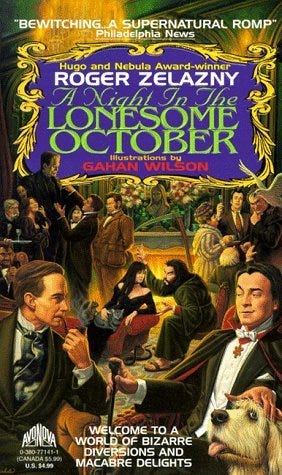Digest, 8/8/2021: When Life is Hard, You Have to Change
the fifteenth weekly digest post
Sorry I’m late this week.
I continue to hear from people about the number of subscriber only posts, again mostly supportive with some committed advocates for less free, more paywalled. A couple weeks ago I had two paywalled posts, and was intending to this past week but it didn’t work out. But I have every intention of doing more, including an interview series I’m trying to figure out how to do technically. (Probably a half hour for everybody, another 45 minutes to an hour for subscribers.) But there’s a lot of moving parts there. I am on it, though, and appreciate your patience. I will say though that this is always going to be a “most things for everybody” newsletter. I understand that a lot of the bigger Substacks gate almost everything, and I respect their right to make those decisions. But me, personally, I want to make most things free, both for its own sake and also because I continue to think that’s the better marketing strategy for me. I do respect the fact that some people will be disinclined to sign up or to renew for that reason, and of course that’s their right.
This Week’s Posts
Monday, August 2nd - Nü-Metal and Twilight Are the True Outsider Art, the Only Rebel Poets
With culture fracturing and opportunity for an authentic counterculture thus falling away, the only way an artistic movement or production can oppose the dominant trends is by being widely loathed. Also that HBOMax Woodstock 99 documentary sucked ass.
Tuesday, August 3rd - Anatomy of a Bad Idea: Affirmative Consent
What affirmative consent is, how it became an obligatory position among progressives, and why it was always bound to fail.
Thursday, August 5th - We Walk Among You
This post is about mental illness, the tangled question of the moral responsibility of those who suffer from it, and the totally impoverished stance of the social justice movement, which gives us by turns infantilizing absolution or no concern at all, depending on whether they already like you.
Friday, August 6th - Five Books for Readers Aged 10-14 (subscriber only)
By request, a little list of five treasured books from my own childhood that are well-suited for older children. Great suggestions in the comments too.
And we got Chapter Four of The Red, the Brown, the Green this week!
From the Archives
Gaslighting once meant something specific and genuinely pernicious, and so the rise of the term was valuable. Then it was overused to the point of absurdity, and now it means little more than “a man disagrees with me.” Mansplaining, too, is a real tihng, and a bad one, and so at first the term was valuable. And then people wallpapered the internet with it, people had absolutely no discipline about using it, and it now means little more than “a man has an opinion.” That’s a shame, yes because it’s dumb for people to be accused of these things when they’re not guilty, but also because the vitality and power of these accusations have been completely sapped by being stretched in this way. I call this “critique drift,” and I wrote all about it for In These Times magazine.
Song of the Week
Substack of the Week
Construction Physics, by Brian Potter
When I’m asked for advice about how to make writing your full-time gig, as I am lucky to do, it’s usually a long string of “do what I say, not what I do.” You can probably guess most of it. But one big part is that you shouldn’t be a generalist. You should identify a niche and fill it. (Be weird.) I think you should have range and be well-rounded, of course, and it is possible to overspecialize to the point that you’re essentially locked out of other kinds of opportunity. But in general, you’re trying to make it in a very crowded market under uncertain economic conditions. Specialization makes it less likely that an editor is going to be able to choose any one of a hundred people over you, and when you negotiate1 you have more leverage. This platform is in fact a tribute to the glories of specialization, at least from the reader’s side; I don’t care what you’re into, there’s a newsletter all about it. Which is great, one of the few things that makes the internet worth the hassle.
Construction Physics is a really good example. It explains exactly what its tagline says - why buildings are built the way they are. I could not possibly have less prerequisite knowledge in this domain, but I find it all really fascinating, and Potter has a real skill for explaining something in digestible terms without dumbing it down. This post on why it’s proven very difficult to automate masonry is a great place to start, sharp, filled with little tidbits, and connected to much broader societal themes. Check it out.
Book Recommendation
A Night in the Lonesome October, Roger Zelazny, 1994
I’m tempted to save this one for October (during which these weekly digests will be covered in festive Halloween decorations, fair warning) but I love this book so much I want to share it now. This book is about Jack the Ripper, Dracula, Rasputin, Sherlock Holmes, Dr. Jekyll & Mr. Hyde - but it stars Snuff, Jack the Ripper’s loyal dog. The scenario is classic Zelazny: in a vaguely Victorian London, a dark ritual will soon take place, a ritual to open a portal to allow the elder gods to destroy the world… or to keep that door closed. These infamous characters are arrayed against each other, but most keep their orientation (opener or closer) secret. This is a fun, spooky, lighthearted book about the macabre, and Snuff’s perspective on it all is consistently funny. Great for any Halloween fans, and Gahan Wilson’s illustrations are great. A keeper.
Comment of the Week
10 to 14 is such a huge growth period for kids... here's what I can remember being obsessed with at each of those ages.
10: A Little Princess, Frances Hodgson Burnett. One of the first books that introduced me to the idea that your mindset matters more than your circumstances. Essential prep for the junior high years.
11: The Westing Game, Ellen Raskin. Freddie's already explained why. I read this book so often the cover fell off.
12: The Shoes books, Noel Streatfeild. I was a little old for the language, but if you are a certain kind of kid these books read as a technical manual of how to practice. I was obsessed with L.M. Montgomery's Emily of New Moon series for the same reason. I still refer back to both of these books when I need a discipline boost. Plus, they're incredibly cozy.
13: Pride and Prejudice, Jane Austen. It helped that this was right when the 1995 miniseries came out.
14: Les Miserables, Victor Hugo. By 14 I was done with "kids books," for better or for worse. TEACH ME ABOUT THE ADULT WORLD, VICTOR HUGO. (Also I was kind of obsessed with the musical.)
15 (bonus): Anna Karenina and every Agatha Christie in the library. - Nicole Dieker
That’s from the wonderful discussion about books for older children in this week’s subscriber-only post, which you can only see if you subscribe! So subscribe already! Thanks all, talk to you soon.
You should negotiate, when you’re freelancing. Ask for 20% more than they offer. If they say no, it’s cool, you tried. Learning to ask for what you’re worth is, in my experience, harder on young writers than simply getting published in the first place. If an editor accepts a pitch or otherwise agrees to publish you, but rescinds the offer because you try to negotiate the fee, send me an email at my freddie7 gmail address and I’ll make sure that editor is publicly shamed. Because that’s an unprofessional shithead thing to do.






Regarding the number of paid vs. free posts, I want to state for the record that I am perfectly happy with the current balance. I fear you may not hear very often from those of us who are satisfied with the amount of paywalled content and who even appreciate that you provide free access to a fair number of posts. You have a true gift and I support you in sharing it as you choose.
I am firmly against the idea of “less free, more paid”. That would only serve to take away from others while gaining me nothing. The paywalled posts incentivize payment, and so act as a tool for Freddie, but if he opened up every subscriber post we would end up with exactly what we already have.
We pay Freddie because if we don’t he can’t write for us. I, personally, pay Freddie so his ideas disseminate to the wider public.